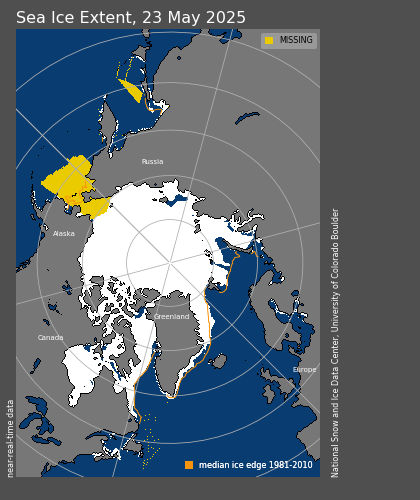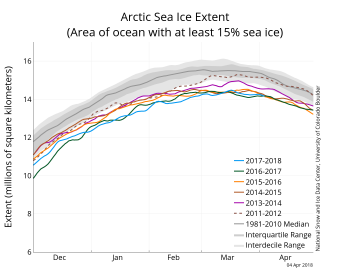Environment & Energy
Related: About this forumMarch Arctic Sea Ice Area 2nd-Lowest On Record For Month; Bering Sea Ice Loss Striking This Season

The 2018 winter sea ice maximum has passed, and the melt season has begun. The most notable aspect of the 2017 to 2018 winter ice extent was the persistently low ice extent in the Bering Sea. While December, January, and February were characterized by very warm conditions over the Arctic, March temperatures were mixed, with cool conditions over the Eurasian side and moderately warm conditions over the North American side.
Arctic sea ice extent for March 2018 averaged 14.30 million square kilometers (5.52 million square miles), the second lowest in the 1979 to 2018 satellite record. This was 1.13 million square kilometers (436,300 square miles) below the 1981 to 2010 average and 30,000 square kilometers (11,600 square miles) above the record low March extent in 2017. Extent at the end of the month was far below average in the Bering Sea, as it has been for the past several months, and slightly below average in the far northern Atlantic Ocean and Barents Sea. Ice extent was slightly above average in the Sea of Okhotsk.

Overall, ice extent for March 2018 changed little. Extent reached the annual maximum on March 17 and declined by March 31 to nearly the same level as at the beginning of the month. Ice loss following the seasonal maximum has been almost entirely restricted to the Bering Sea and the Sea of Okhotsk, with slight increases in extent in the Barents Sea and near Svalbard.
Air temperatures at the 925 hPa level (about 2,500 feet above sea level) were 2 to 4 degrees Celsius (4 to 7 degrees Fahrenheit) higher than average in regions near Greenland and Alaska. Cooler conditions prevailed over Scandinavia, the Kara Sea, and far eastern Siberia, where temperatures were generally 4 to 7 degrees Celsius (7 to 13 degrees Fahrenheit) below average.
Higher than average sea level pressure was present over the western Arctic, including Canada, the Beaufort Sea, and Greenland, while lower than average sea level pressure prevailed over most of Europe and Siberia. This pattern was associated with winds from the south in the Bering Sea and Alaska, helping to push ice toward the pole. Conversely, over Scandinavia and the Barents Sea this pressure pattern resulted in winds from the northeast that pushed Arctic air onto the northern Eurasian landmass leading to colder air temperatures.
The Arctic Oscillation (AO), an indicator for general wind, precipitation, and temperature patterns in the Arctic, was strongly negative in early March, reflecting the higher than average sea level pressure in the western Arctic. This negative phase is characterized by a weakening of the circumpolar wind pattern, a pattern that favors cold air outbreaks over much of the United States as well as parts of Europe and Asia.

The linear rate of decline for March ice extent is 42,200 square kilometers (16,400 square miles) per year, or 2.7 percent per decade relative to the 1981 to 2010 average.
EDIT
http://nsidc.org/arcticseaicenews/
Fred Sanders
(23,946 posts)corporate media encourage the equalization of science and science fiction, as if it is all a game to be played purely for bragging rights ratings turf? Just a pissing match to them.
End of rant.
💥💥💥💥💥💥💥💥💥💥💥💥💥💥💥💥💥💥💥💥💥💥💥💥💥💥💥💥💥💥💥💥💥💥💥💥💥💥🌈
c-rational
(2,593 posts)Eliot Rosewater
(31,112 posts)Until we talk about them that way , eventually arrest and imprison them, nothing will change.
In the future they will look back on us NOW and say what the FUCK were we thinking that we didnt stop this NOW
Fred Sanders
(23,946 posts)are at least trying. The West belched carbon into the air for 100 years using cheap energy, but the new emerging powers can not...the cheap oil is long gone. Would not doubt a science denier will be treated like a madman there!
Reality is going to kick Republican ass to the curb soon enough on so many things. Long overdue.
Eliot Rosewater
(31,112 posts)If he could push a button that eliminated all people who dont like him, he would do it.